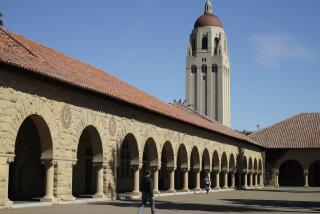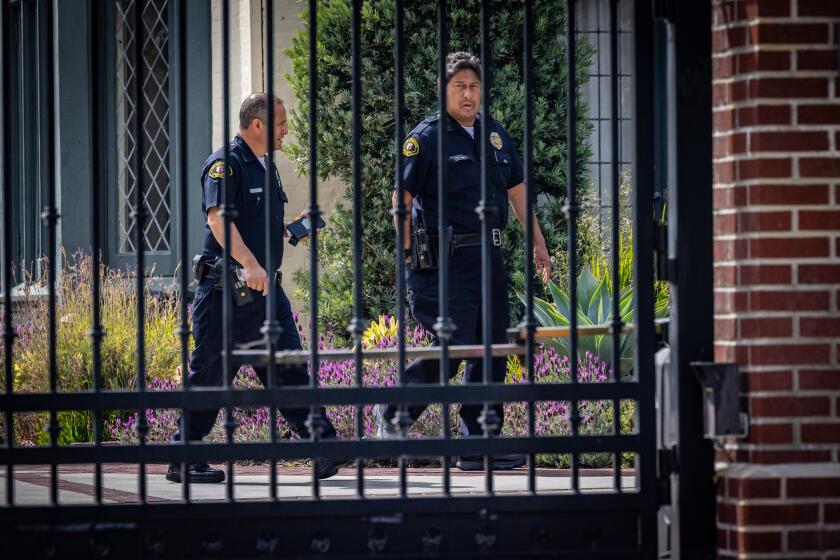San Diego State campus latest to impose mandatory ‘success fee’
San Diego State University is the latest Cal State campus to impose a mandatory “student success fee,” a controversial new charge that critics have blasted as a sidestep around the system’s commitment to freeze tuition.
Students in the fall will pay $50, with the fee increasing over the next four years to $200 per semester. This is in addition to the current annual tuition of $5,472 and other campus-based enrollment fees that average more than $1,200.
The San Diego campus was among several -- Fullerton, Dominguez Hills and Fresno -- that were considering the success fees to help pay for basic educational services such as faculty hiring, increased class offerings, counseling and other needs.
Nine other campuses -- including Los Angeles, Long Beach and Northridge -- already charge such fees, which must be approved by Cal State Chancellor Timothy P. White but not by the Board of Trustees.
San Diego State President Elliot Hirshman, in a blog post Friday, said the fee had been approved by White after a number of student forums and the recommendation of a campus advisory committee.
Hirshman said the success fee was motivated by “limited resources” that have yet to fully rebound from the recession. Despite recent funding increases, state support for the campus is at $78 million, or 35% below its 2007 level, he said.
“We have addressed this challenge by seeking cost efficiencies and increasing revenues from diverse sources, including private fundraising, non-resident student tuition and our auxiliary organizations,” Hirshman said.
There was no campus-wide referendum, but officials said more than 1,000 students attended forums -- with 64% of participants saying they approved a fee of $200 or more.
“The primary rational for these votes was that benefits to students of additional faculty members and co-curricular opportunities outweighed the costs,” Hirshman said.
A spokesman said White based his approval on recommendations from the campus community, and that each campus proposal is judged individually.
“Ultimately, San Diego laid out compelling reasons that additional revenues would lead to improvements for students,” spokesman Mike Uhlenkamp said.
But the success fees remain a contentious issue on campuses. At Fullerton, an advisory committee voted to cut a proposed $240.50 per-semester success fee to $181, to be phased in over three years.
The revenues would be mainly allocated to classes, counselors and other academic needs rather than athletics and expanding the student union building, which were among the proposed uses.
“The theme that seems to have arisen is that students really wanted to spend money on academically related activities,” said Fullerton spokesman Christopher Bugbee.
The proposed fee is now with President Mildred Garcia, who will decide whether to seek White’s approval, Bugbee said.
Dominguez Hills students, meanwhile, say they have gathered nearly 700 signatures on an Internet petition asking President Willie J. Hagan to drop a proposed $280 per-semester success fee at the Carson campus.
Robert DeWitz, a Dominguez Hills psychology major who has been leading protests, said students from community colleges such as El Camino, Cerritos, Pasadena and Long Beach are expressing concerns that the fee could hamper their ability to transfer to the campus.
Students from a number of campuses are scheduled to take their grievances to the Board of Trustees, who meet in Long Beach next week. Gov. Jerry Brown, who has sought increased funding for higher education in return for stable tuition, typically also attends the meeting.
“These fees are not going to improve student success, they are going to hinder it,” DeWitz said. “There’s little to no research on the impact they’re going to have on students. We believe the CSUs do need more funding ... but the trustees and the chancellor should be working with Gov. Brown to get more state funding instead of taking the easy option of imposing more fees on students.”
carla.rivera@latimes.com
Twitter:CarlaRiveralat
More to Read
Start your day right
Sign up for Essential California for news, features and recommendations from the L.A. Times and beyond in your inbox six days a week.
You may occasionally receive promotional content from the Los Angeles Times.







